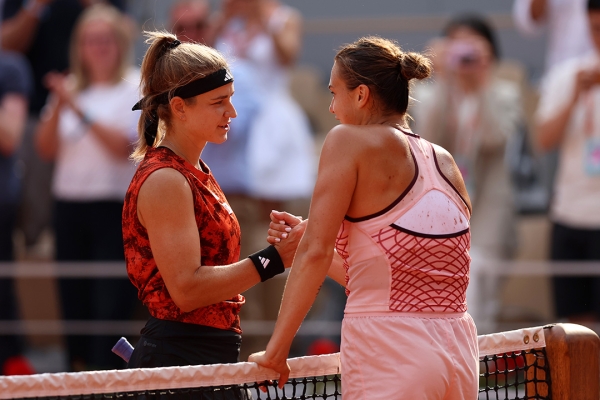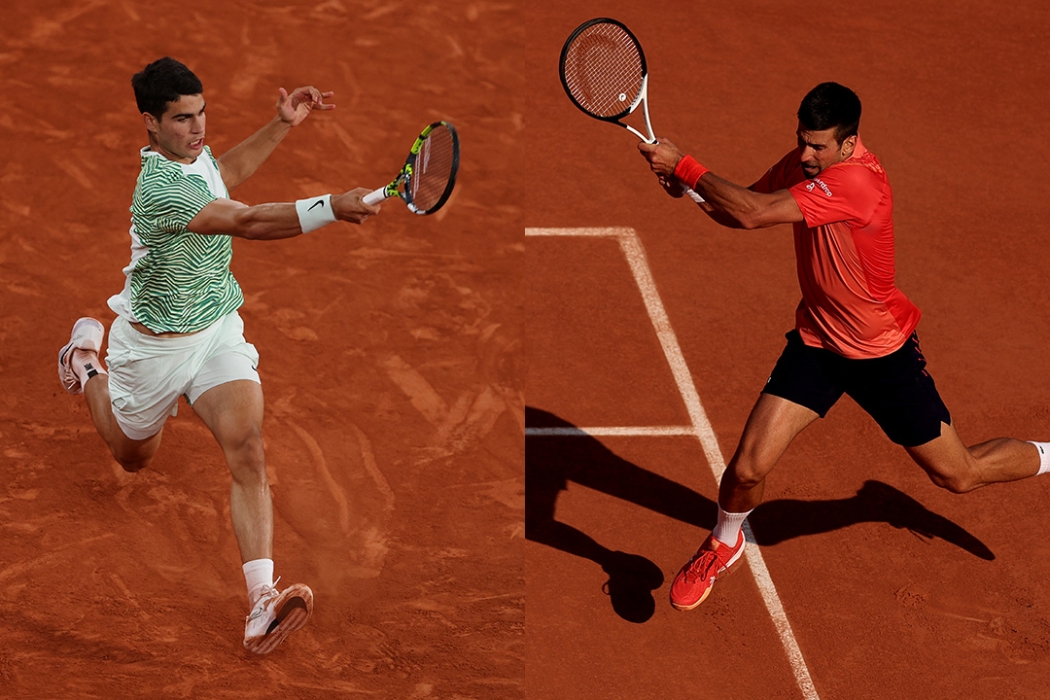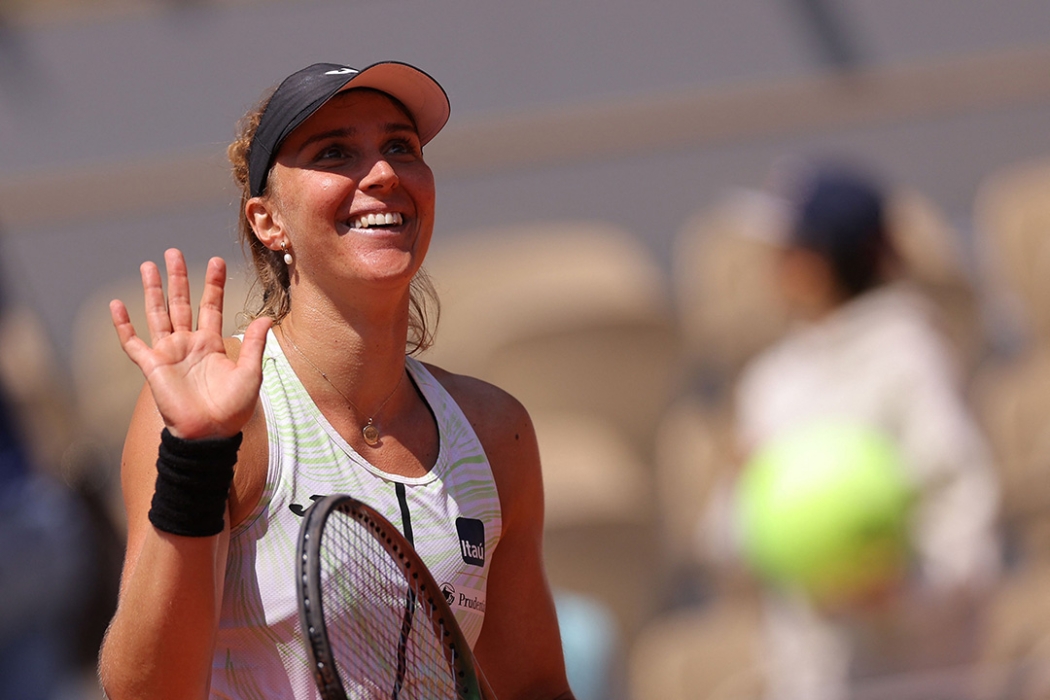Karolina Muchova’s progression to the Roland Garros final is one of those sporting performances both surprising and unsurprising in equal measure.
Surprising, given she is ranked outside the top 40, has struggled for form and continuity due to injuries, and faced a match point when trailing 2-5 in the third set of her semifinal against Aryna Sabalenka – the tour’s most in-form player.
Yet it’s unsurprising, given her immense talent, and ability to attain her highest level on the game’s biggest stages.
The 26-year-old Czech rebounded to stun world No.2 Sabalenka 7-6(5) 6-7(5) 7-5, moving through to her first Grand Slam final, where formidable world No.1 Iga Swiatek awaits.

The result puts Muchova on the brink of a phenomenal achievement; she could become the first woman to beat the world’s top two in a Grand Slam semifinal and final since Maria Sharapova at the 2006 US Open.
And should she do so, she would have halted two impressive streaks.
Sabalenka, the reigning Australian Open champion, was 12-0 at the majors in 2023. And now, Muchova confronts Swiatek, unbeaten in 13 matches at Roland Garros.
A triumph for the 43rd-ranked Muchova is not unthinkable; the similarly-ranked Jelena Ostapenko won the title in 2017, as did Swiatek herself in 2020, when ranked 54th.
“Who knows what can happen,” said Muchova, answering a question about how her career might have unfolded without injuries, but a response applying equally well to Saturday’s final.
“I think everything has its own time. In the past, it was not easy. That's actually what makes me appreciate this result even more now, because I know what I have been through in the past.
“To be now in a Grand Slam final, it's for sure my dream. I'm super, super glad that I'm here.”
Many others are glad she’s here, too.
The assorted injuries blighting Muchova’s progress have in the past three seasons contributed to four walkovers to opponents and three defeats via retirement. One of those retirements came at Roland Garros last year, leaving her distressed.
But when she’s been healthy, she has captivated fans with her imaginative, athletic, complete brand of tennis, which has served her well on all surfaces.
Commentating on the world feed as she completed her upset of Sabalenka, broadcaster Chris Bowers said: “She’s almost a throwback to a bygone age; she’s married the great traditions of the slice and the volley, with the modern game.”

And during the on-court interview that followed, Swedish legend Mats Wilander put the following question to her: “Your game is incredible, the combination of shots, slice backhands, drop-shots, coming to the net, I mean, we don’t see that, that much. So natural. Is that normal?”
Muchova laughed slightly as she answered: “I’ve heard it, people are telling it to me, and I don’t wanna hear it, I don’t wanna get into my head too much to become cocky or anything.
“I’m just trying to play my game and we work on it, and I’m glad it worked so well.”
Thriving on the big stage
Muchova would be entitled to be slightly cocky, given her increasingly renowned status as a ‘big-match’ player.
Although she has an overall record of 9-11 against top 10 opponents, her performance against this group spikes at the majors. She has won six of nine matches against the top 10 in Grand Slam play, a record comparable with some elite names.
One of those top-10 wins came over eighth seed Maria Sakkari in the first round in Paris this fortnight, setting her off on a successful course.
Even more incredibly, she has never lost to a top-three player in her career; her win over Sabalenka improved her record to a flawless 5-0.
One of those wins came in the Australian Open 2021 quarterfinals over Ash Barty, the recently retired former world No.1 to whom Muchova is often compared.
That was the first time she reached a major semifinal, and she came very close to the final, before a dramatic three-set loss to Jennifer Brady.
That proof, two years ago, of her high ceiling makes this run in Paris unsurprising. But also unsurprising? She was forced to skip Australian Open 2022, as injury struck again.
Interestingly, Barty was a player who historically troubled Swiatek. And Muchova goes into Saturday’s final with a 1-0 record over the Polish star – albeit a win that came before Swiatek developed into the player she is today.
The final: Muchova v Swiatek
“I don't think I will be the favourite. I didn't really even know about this (top-three) statistic,” Muchova said.
“It just shows me that I can play against them. I can compete, and obviously the matches are super close. Even today, match ball down, you really never know if I win or lose.
“But it's great to know that I have the chance to win and I win against the top players, and that for sure boosts my confidence.”
READ MORE: Women's game benefitting from Swiatek effect
Swiatek was also 0-1 against her semifinal opponent Beatriz Haddad Maia, but reversed that result in the second semifinal on Thursday.
Her 6-2 7-6(7) win propelled her into a third Roland Garros final in the past four years, and improved her already-imperious statistics at a tournament she has come to dominate.
Swiatek, despite not having faced the Czech in more than four years, knows her well and is another admirer of her sublime game.
And as she targets a fourth Grand Slam singles title, she is wary of the danger Muchova poses.
“I played many practices with her since 2019, and I also watch her actually more than most of the players. Just a coincidence, but it happened,” Swiatek revealed.
Iga Swiatek talks to the media after reaching her third Roland Garros final. pic.twitter.com/AXu8ZCjBMX
— Jimmie48 Photography (@JJlovesTennis) June 8, 2023
“I really like her game, honestly. I really respect her, and she's I feel like a player who can do anything. She has great touch. She can also speed up the game. She plays with that kind of, I don't know, freedom in her movements. And she has a great technique.
“So I watched her matches and I feel like I know her game pretty well. But obviously on matches, it's a little bit different.
“I'll be ready no matter what.”

